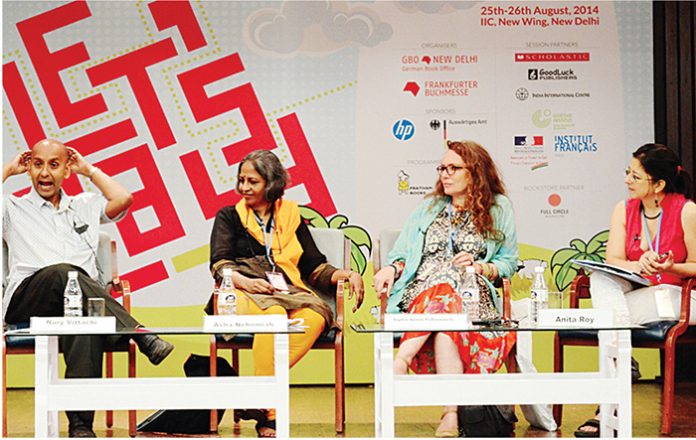
The GBO conference on children’s content got off to a Jumpstart with Nury Vittachi the author of the crime comedy novel series The Feng Shui Detective and the funny man behind ‘The Curious Dairy of Mr Jam’ and the Scholastic Asia Book Prize setting the tone for the day. One of Asia’s best known columnist and a delightful speaker Vittachi spoke about the importance of children’s content creators and supported this with well researched facts and figures. “From Harry Potter to The Hunger Games and right now The Fault In Our Stars, it demonstrates how children’s literature underlies and dominates the whole entertainment industry,” he said. Vittachi spoke about creativity in the Asian context and asked the audience searching questions — does it exist, did it exist? There was much food for thought there, but Vittachi buffered it all with numbers and went on to add that in any case by the next thirty years three in four people will be from Asia or Africa.
Bringing the playroom to books
The sessions that followed Playwrite — the idea of play in children’s books’ and Playschool — play in and as pedagogy, flowed seamlessly from one to the other in many ways. Sophie Benini Pietromarchi, who conducted
the illustration master class began the Playwrite session enacting a dream and underlined the importance of it, along with playing. Encouraging everyone to go play with children and go on a treasure hunt and collect all the treasures to be able to create magic on a page, she asked the creators of children’s books present — whether your design allows your reader to experience the book. “The process of creating a children’s book, is not simplification but rather a going back to the essentials,” she said. The process of illustration also allows you to be universal at another level, and as a creator of children’s books, you have a second chance at being a child.
Penguin author of children’s books Asha Nehemiah said, “Children don’t need an invitation to play, they simply do, and in the most unusual ways.” She spoke about how as a writer for children, she uses the simple and seemingly ordinary to weave stories. “Children don’t just accept but they embrace the magic in your stories,” she said ending her presentation with the words, “When children engage playfully, noisily and happily with stories, pictures and words, don’t just encourage them, join them.” Nury Vittachi, back on this panel spoke about harnessing a child’s creativity, entertaining everyone with the story of how the originally conceived title of
‘Mr. Edward Teddy Bear’ became Winnie the Pooh and it was the writer’s child who came up with the name for the iconic character of children’s fiction. The way humour works with children and adults is very different. “How do we stop being adults and think like children? Why do we want our children to grow so fast? Do we give children enough space to be creative? Do we impose moral truths on children? These questions need to be answered,” said Vittachi.
Bringing the playroom to schools
The next session was on Playschool — play in and as pedagogy and began with educationist Amukta Mahapatra, who is presently involved in a committee that is reviewing activity-based learning and its variations in seven states in India.
She spoke about the natural instinct that all human beings have to explore. Very often adults use ‘play’ patronizingly with children and this defeats the purpose, harming a child’s natural instinct. Children take play very seriously, but, she says our education system allows for very little play and exploring. A child’s natural tendencies are suppressed, and learning is imposed on children via outdated models. There is a need for more awareness so that we allow children to live more spontaneously.
EK Shaji of Judo Gyan, does what seems to be quite a tough thing, he teaches children to ‘love math,’ though he seemed perfectly happy, doing what he does, we find out why. ‘We seldom see a math teacher smile! ’ he said. He demonstrated simple yet very effective ways to teach children how to grasp mathematical concepts, guided by basic principles, such as; starting from the world of a child’s experiences and he says the key was to take them to the world of mathematics, teach through experience — touch, feel, converse and base activities on things which are close to children. Sujata Noronha, shared her work and learnings at the Bookworm Trust in Goa, which believes in taking ‘good books’ to children. She spoke about the difficulty to find books that relate to children’s contexts in India, books that spoke about death and anger and more.












